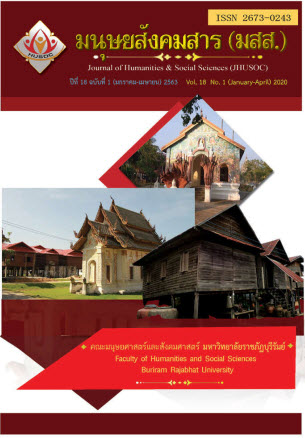Participatory Management Approaches for Sustainable Community Economy Development of Baan Pho Chai Mushroom Growing Group, Pho Chai Sub-district, Wapi Pathum District, Maha Sarakham Province
Main Article Content
Abstract
This research was a participatory action research (Participatory Action Research : PAR) which aimed to study the context of Baan Pho Chai mushroom growing group, current problems in management of Baan Pho Chai mushroom growing group and participatory management approaches of Baan Pho Chai Mushroom Growing Group, Pho Chai Sub-District, Wapi Pathum District, Maha Sarakham Province. The data were collected from 30 members of mushroom growing group of Village No.5 Baan Pho Chai. The samples were selected by using a purposive sampling method and Baan Pho Chai mushroom growing group were chosen 30 members. The tools used for data collection were group discussion, observation and interview.
The results revealed that 1) the context of Baan Pho Chai Mushroom Growing Group showed that the main occupation was farming. The labor rates in the village were 150-200 baht per day and the average income was 46,220 baht per person per year for occupational groups and there were 13 groups of community self-development, 2) the current problems in management of Baan Pho Chai mushroom growing group were divided into two issues which consisted of 2.1) management aspect which can be concluded that the group's implementations were clearly defined by group management in terms of committee; however, rules and regulations for joint implementation were not established and 2.2) financial aspect which was concluded that the group had saved money which can be loaned by the members. Nonetheless, the problem was that the members could not return the money to the group which resulting in the lack of cash flow in the implementation, causing the implementation to stop for some time, and 3) participatory management approaches of Baan Pho Chai Mushroom Growing Group found by the group members suggested that nine guidelines were required in order to archive successful implementation.
Article Details

This work is licensed under a Creative Commons Attribution-NonCommercial 4.0 International License.
เนื้อหาและข้อมูลในบทความที่ลงตีพิมพ์ในวารสารทดสอบระบบ ThaiJo2 ถือเป็นข้อคิดเห็นและความรับผิดชอบของผู้เขียนบทความโดยตรงซึ่งกองบรรณาธิการวารสาร ไม่จำเป็นต้องเห็นด้วย หรือร่วมรับผิดชอบใดๆ
บทความ ข้อมูล เนื้อหา รูปภาพ ฯลฯ ที่ได้รับการตีพิมพ์ในวารสารทดสอบระบบ ThaiJo2 ถือเป็นลิขสิทธิ์ของวารสารทดสอบระบบ ThaiJo2 หากบุคคลหรือหน่วยงานใดต้องการนำทั้งหมดหรือส่วนหนึ่งส่วนใดไปเผยแพร่ต่อหรือเพื่อกระทำการใดๆ จะต้องได้รับอนุญาตเป็นลายลักอักษรจากวารสารทดสอบระบบ ThaiJo2 ก่อนเท่านั้น
References
Chedeng, H. and Choosuk, C. (2015). Guidelines for Developing Women’s Chilli Paste Group Of Bannode Tambon
Administration Organisation, Saba Yoi District, Songkhla Province. Proceedings of the 6th Hatyai National
Conference. Hatyai, Thailand. 356-367. On 26th June 2015. Songkhla : Hatyai University. [in Thai]
Chomraka, I. (2011). A communities enterprises marketing network management model for increasing the
quality of commercial competition in Uttaradit Province. Area Based Development Research Journal, 3(5) : 39
- 51. Bangkok : Thailand Science Research and Innovation. [in Thai]
Chandaeng, W. (2012). The development for strengthened community management corresponding to
sufficiency economy in the upper central provinces of Thailand. Thesis, Ph.D. (Public Administration). Pathum
Thani: College of Management Innovation. Valaya Alongkorn Rajabhat University under Royal Patronage. [in
Thai]
Kenaphoom, S. (2016). The community business management model : case study of the cages fish farming
groups and the farming fish cooperative, Kosumphisai district, Mahasarakham province. VRU Research and
Development Journal Humanities and Social Science. 11(1) : 35 - 43. [in Thai]
Mongsamak, P. (2013). The Success Managerial Model for Herbal Products of the Community Enterprise Network
Group at Nakhonchaiburin Provincial Group. Journal of the Association of Researchers, 18(3): 115-123. [in
Thai]
Nilwan, D., et al. (2010). The knowledge management for developing community business based-on concept of
sufficiency economy of Ban-Dokdang Sewing group, Sa-ngaban Sub-District, Doi Saked, Chiangmai
(Research Report). Chiangmai : Chiangmai Rajabhat University. [in Thai]
Promsaka Na Sakolnakorn, T. and Sungkharat, U. (2014). Development guidelines for small and micro
community enterprises in Songkhla Lake Basin. Journal of Humanities and Social Sciences, 7(1) : 97 - 122. [in
Thai]
Sungraksa, N. and Unaromlert, T. (2009). Good Effects from Application of Sufficiency Economic Philosophy in the
Learning Process and Knowledge Management for Sustainable Development of Community Enterprise :
Case Study of Ratchaburi Province (Research Report). Bangkok : National Research Council of Thailand. [in
Thai]
Thamma, K. (2014). Guidelines for occupation group development : A case study of occupation group adaptation
of reed, Baan Wa Village, Baan Wa Sub-district, Muaeng Khon kaen district, Khon kaen Province. Proceedings
of the National and international academic conferences 4th Sustainable Development. June 11-13, 2014.
Khonkaen : Khonkaen University. [in Thai]
Thnogsri, N. (2016). The management models of small and micro community enterprise of silks product groups
in Buriram Province. Rommayasan Journal, Faculty of Humanities and Social Sciences, Buriram Rajabhat
University, 14(1) : 215 - 228. [in Thai]
Wongwirach, K. (2008). Management model for farmers in the cultivation of organic vegetables Ban Jum, Yang
Khok Sub-district, Hang Chat District, Lampang Province (Research Report). Bangkok : Thailand Science
Research and Innovation. [in Thai]


